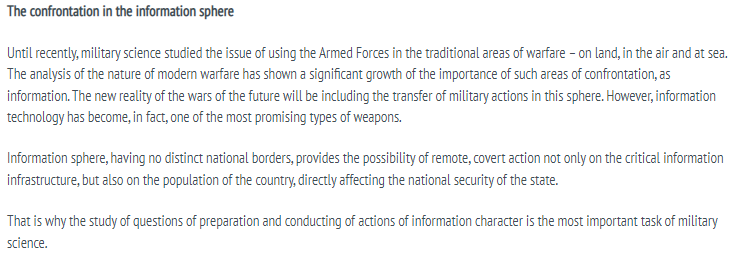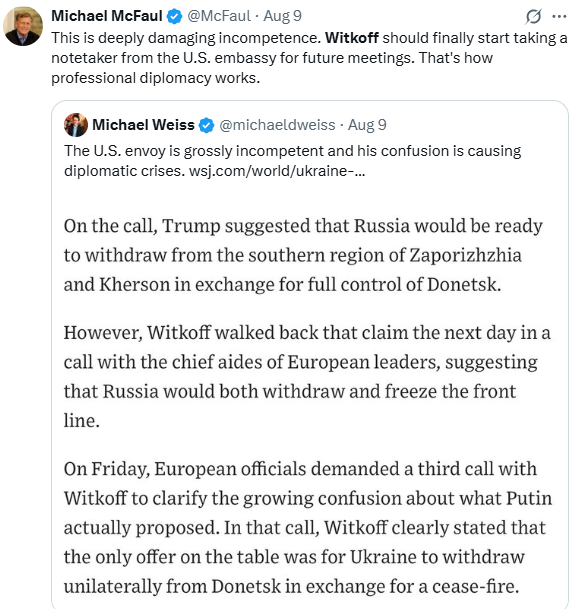The War That Isn't.
A🧵about problems to notice #war being waged.
Hybrid & asymmetric tools for conflict gained a prominent place in the discussion about security policy.
But where is the threshold when confrontation turns into war?
Is our perception of "War" outdated?
/1
A🧵about problems to notice #war being waged.
Hybrid & asymmetric tools for conflict gained a prominent place in the discussion about security policy.
But where is the threshold when confrontation turns into war?
Is our perception of "War" outdated?
/1

TLDR:
Many ignore that Russia is at war with the West.
- our perception of war is lacking
- war is (oh wonder) stigmatised
- deescalation is a failing mantra
- RF aims for regime/governance change
- RF's pursuit of global change presents kinetic threat
- we have little defense
/2
Many ignore that Russia is at war with the West.
- our perception of war is lacking
- war is (oh wonder) stigmatised
- deescalation is a failing mantra
- RF aims for regime/governance change
- RF's pursuit of global change presents kinetic threat
- we have little defense
/2
Boring part 1st:
What do we think war actually is?
Mostly it's seen as armed conflict between organised (political) groups. The means used may vary, but it's centered around some kind of military using kinetic force to achieve political goals.
But what about "War" v "Warfare"?
/3
What do we think war actually is?
Mostly it's seen as armed conflict between organised (political) groups. The means used may vary, but it's centered around some kind of military using kinetic force to achieve political goals.
But what about "War" v "Warfare"?
/3

So the ways and means a war can be conducted have developed far beyond the kinetic domain. Colloquially we speak of "information war" as type of war without any military engaging on the field.
To complicate things wars seldom are declared, labeled as mere "operation" of sort.
/4
To complicate things wars seldom are declared, labeled as mere "operation" of sort.
/4
"War" has an understandable stigma.
We dislike war, it is nasty, people die and seldomly anything good comes from it. Especially to our Western societies "war" is a hard sell.
While we talk about "cyber war" many believe all is well as long as it does not turn into "real" war.
/5
We dislike war, it is nasty, people die and seldomly anything good comes from it. Especially to our Western societies "war" is a hard sell.
While we talk about "cyber war" many believe all is well as long as it does not turn into "real" war.
/5

Ignoring the threat of non kinetic warfare, wishing away the severe hostility is a major threat.
Russia is aiming to destabilize our society, change government and system of governance to further her geo-political goals.
This threatens our very lives as much as a kinetic war.
/6
Russia is aiming to destabilize our society, change government and system of governance to further her geo-political goals.
This threatens our very lives as much as a kinetic war.
/6

We have witnessed the (preliminary) results of russian hybrid campaigns already.
- furthering dissent up to a violent coup attempt
- facilitating nationalism to the exit of an EU Nation
- stoking left/right extremism in other countries
- attacking critical infrastructure
/7
- furthering dissent up to a violent coup attempt
- facilitating nationalism to the exit of an EU Nation
- stoking left/right extremism in other countries
- attacking critical infrastructure
/7

All these RF actions cost us. Not only in political stability and economically, but ultimately they cost lives. Especially since RF desires to weaken our states ability to protect our interests. Unrest in other parts of the world stoked by RF affects us, eventually kinetic.
/8
/8

The recent situation in Sudan and northern/central Africa is just a hint of things to come. Stoking conflicts there has potential to induce domestic problems for our countries. Worrying is RF's potential employment of Rosatom etc. to use proliferation as destabilising element.
/9
/9

While the conflict RF wages against us is not kinetic an example how RF's kinetic involvement elsewhere domestically affects us is migration resulting from wars in Syria, Africa and also Ukraine.
Unsurprisingly RF influence campaigns stoke resentments vs refugees RF produces.
/10
Unsurprisingly RF influence campaigns stoke resentments vs refugees RF produces.
/10

All this is not new methodology. In the cold war era the CCCP utilized the peace movement, ran extensive influence campaigns in culture and academia for example in Europe.
But back then it was much easier to identify and counter subterfuge ops from abroad.
Resilience was key.
/11
But back then it was much easier to identify and counter subterfuge ops from abroad.
Resilience was key.
/11

The population was well informed about the ongoing conflict. The system competition was apparent, sensibility about Russian attempts to infiltrate society was wide spread.
Institutions and media tried to actively safeguard. Resilience was institutionalized and social concept.
/12
Institutions and media tried to actively safeguard. Resilience was institutionalized and social concept.
/12

Enter the "End of History". For the West, especially western Europe, an era of hope and cooperation started. Especially in Germany, which finally overcame the trauma of division, there was a strong desire to integrate the new Russian Federation culturally and economically.
/13
/13

The trauma of war and nuclear threat was replaced with the idea that cooperating with and integrating RF with cultural and economic bonds would create a win-win situation and produce benefits similar to the European process.
The idea was to create prosperous security WITH RF.
/14
The idea was to create prosperous security WITH RF.
/14

These developments lay the foundation for Russian influence campaigns today. "No war with Russia" is a common slogan on pro-RF rallies, left/right extremist movements fly more Russian than German flags on their gatherings. Many in the population fear escalation into open war.
/15
/15

Russian agencies ran decade long influence campaigns in social media and by financing/grooming extremist political movements that now openly propagate a pro RF agenda.
This happened in plain view. State actors were informed but decided on inaction, at times participation.
/16

This happened in plain view. State actors were informed but decided on inaction, at times participation.
/16


Enter today's reality.
We face a Russia that is waging kinetic war at Ukraine - after their attempts of soft power and influence campaigns failed.
A RF that openly talks about changing world order. It claims NATO is an active enemy, RF politicians threaten with nuclear war.
/17
We face a Russia that is waging kinetic war at Ukraine - after their attempts of soft power and influence campaigns failed.
A RF that openly talks about changing world order. It claims NATO is an active enemy, RF politicians threaten with nuclear war.
/17

While Russian politicians and propaganda paint us as satanist enemies their information war grooms movements in our societies who portrait Russia as friend and our own governments as enemy of the people. Movements openly pushing admiration for Putin and russian autocracy.
/18
/18

In this context it is important to note what General Gerassimov said 2019 (see below).
Regime change of a competitor, in the past, was something obtained through victory and capitulation. Information war enables RF to ideally obtain this goal without a shot fired - a bargain.
/19
Regime change of a competitor, in the past, was something obtained through victory and capitulation. Information war enables RF to ideally obtain this goal without a shot fired - a bargain.
/19

Compared to kinetic war information war is much less risky and cost effective. It comes with plausible deniability, problematic retaliation threshold for the attacked and employs a growing amount of political/societal resources of the attacked as the campaign progresses.
/20
/20
The victim of information war might even be averse to formally recognize being attacked or even to conduct active defensive measures.
After all the tool of warfare are the attacked states own citizens, mostly victims themselves. And countermeasures risk kinetic escalation.
/21
After all the tool of warfare are the attacked states own citizens, mostly victims themselves. And countermeasures risk kinetic escalation.
/21
Opposed to what Russia claims the western doctrine is still mostly focused on de-escalation. Joint Doctrine Note 1-19 acknowledges the new competition environment but is far from directly addressing the threat.
Western politics is even further behind without idea for defense.
/22
Western politics is even further behind without idea for defense.
/22

Concluding:
Our societies and democratic institutions face a severe threat. While influence and information campaigns have long history, modern tech, networking and globalism make us vulnerable to hybrid attacks.
Information War has emerged from tool of warfare to War itself.
/23
Our societies and democratic institutions face a severe threat. While influence and information campaigns have long history, modern tech, networking and globalism make us vulnerable to hybrid attacks.
Information War has emerged from tool of warfare to War itself.
/23

If we fail to recognise War that attacks our nations directly, and not via the tool of military conflict, we remain defenseless in an essential domain.
Autocracies like Russia and China have prepared and created closed domestic information spaces. This empowers their attack.
/24
Autocracies like Russia and China have prepared and created closed domestic information spaces. This empowers their attack.
/24

It is time to read Clausewitz again with a modern understanding:
"war is not merely a political act but a real political instrument, a continuation of political intercourse, a carrying out of the same by other means"
It's high time to drop fear and focus our national defense.
/25
"war is not merely a political act but a real political instrument, a continuation of political intercourse, a carrying out of the same by other means"
It's high time to drop fear and focus our national defense.
/25

• • •
Missing some Tweet in this thread? You can try to
force a refresh











